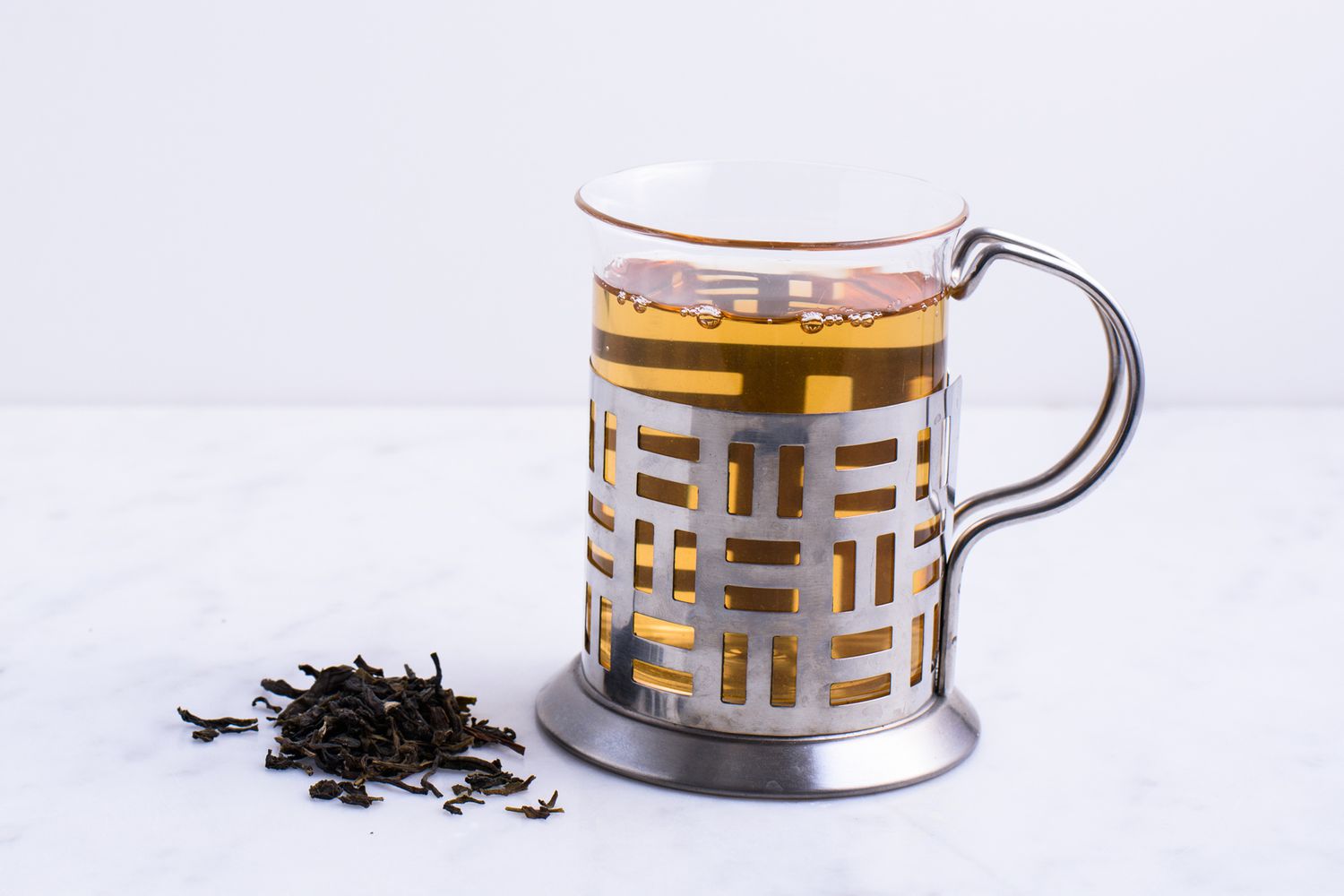Assam Tea Benefits and Side Effects

Verywell / Alexandra Shytsman
Assam tea is black tea from the Assam region of India. This tea is widely available and popular for its rich taste and energy-boosting qualities.
What Is Assam Tea?
Assam tea is a black tea made from the leaves of the Camellia sinensis plant. Black teas are more heavily oxidized than other types of tea, like green tea or white tea. Oxidation is a chemical process that creates darker leaves and a more intense flavor. Assam tea is known for its full-bodied malty flavor, deep aroma, rich color, and brisk taste.
Assam tea gets its name from the Assam region in India, where it is grown. Assam lies along the Brahmaputra River—an area called the Brahmaputra Valley in northeast India, bordering Bangladesh and Myanmar. Assam is the largest tea growing region in the world. The tea here is grown at sea level, in a warm, wet climate. The weather conditions and terrain contribute to the distinct malty flavor of Assam tea.
Assam tea is also known as Assam black tea, breakfast tea, English breakfast tea or Irish breakfast tea. The breakfast tea you see at your local tea shop or at the grocery store may be pure Assam tea or a blend of different tea leaves including Assam.
You can buy Assam tea in tea bags or as a loose tea. Many tea growers recommend that you look for tippy Assam tea or tea leaves that have golden tips—a sign of high quality.
How to Prepare Assam Tea
If you prefer pure black Assam tea, you'll want to prepare it just as you would prepare any traditional tea. Use filtered water if possible and a temperature controlled teapot to regulate water heat.
5 Steps to Prepare Assam Tea
- Place an Assam tea bag or a tea infuser containing about one tablespoon of loose tea leaves in a teacup. You can also place loose tea leaves at the bottom of a cup.
- Heat water to 90-95º Celsius or 194-205º Fahrenheit. If you don't have a temperature-controlled teapot, bring water to a boil and then let sit for a minute to reduce the temperature just slightly.
- Pour eight ounces of water over the tea bag, infuser, or tea leaves.
- Let tea leaves steep for as long as desired. Some drinkers prefer a lighter tea, so a two-minute steep is sufficient. A 3-5 minute steep will brew a stronger darker cup of tea, although steeping too long may introduce bitterness.
- Remove the tea bag or infuser or strain loose leaves from the cup before drinking.
Tea experts often say that Assam tea is best served without milk or sweeteners. However, many breakfast tea lovers still add both. To make Assam milk tea, simply add a tablespoon or two of whole milk and sweeten with cane sugar according to your taste preference.
Does Assam Tea Contain Caffeine?
Assam tea—like all varieties of black tea—contains caffeine. Black tea tends to be higher in caffeine than other types of tea like green tea or white tea. However, a cup of Assam tea will still have less caffeine than a standard cup of black coffee.
In general, a cup of Assam tea will contain about 50-90 milligrams of caffeine per cup. As a basis for comparison, a cup of black coffee contains about 100-150 milligrams per cup. However, the brewing method and the strength of the tea or coffee will affect how much caffeine you consume. A stronger (darker) brew will yield more caffeine.
Assam Tea Health Benefits
One of the most likely Assam tea benefits that you'll experience is a boost in energy and an increase in mental alertness from the caffeine. Many tea drinkers especially enjoy this benefit in the morning rather than in the evening when it can disrupt sleep.
There are other advertised benefits of Assam tea, but scientists haven't been able to confirm with certainty that you'll gain these advantages when you drink it.
For example, consumption of tea has been linked to a reduced risk of cancer. Ongoing research is investigating the relationship. However, the National Cancer Institute and many other health organizations still maintain that even though there is a possibility that tea provides cancer prevention properties, research is still inconclusive.
In addition, black tea contains polyphenols including catechins, flavonoids, and tannins. Polyphenols are plant-based chemicals that may provide health benefits. Researchers have linked consumption of flavonoids to important health outcomes, but scientists advise that more research is needed to say for certain if black tea can significantly boost your health.
Most experts recommend that if you want to take full advantages of any black tea health benefits, use loose leaves (rather than a tea bag) and don't add milk or sugar.
Assam Tea Side Effects
Consuming any beverage with caffeine may produce side effects in some people. These may include increased heartbeat (tachycardia), palpitations, restlessness, nervousness, problems with sleep, or a headache. Some people may even experience nausea, vomiting, diarrhea, and diuresis (or frequent urination). However, according to the National Institutes of Health, there is little evidence of health risks for adults consuming moderate amounts of caffeine or roughly 300 to 400 mg per day.
Kiple, Kenneth F.; Ornelas, Kriemhild C. (October 2000). The Cambridge World History of Food (Volume 1). Cambridge University Press. ISBN 0-521-40216-6.
Polyphenols and Caffeine in Tea Infusions J. Agric. Food Chem., Vol. 49, No. 11, 2001
National Institutes of Health, National Cancer Institute, "Tea and Cancer Prevention"
- Tea and Cancer Prevention. National Cancer Institute. National Institutes of Health.
:max_bytes(150000):strip_icc()/Malia-Frey_1000-2f7768d8777a4ebbac39d628bc31b714.jpg)
:max_bytes(150000):strip_icc()/HeadshotMiaSyn-8f69603e0dac49aea62067a9b2d42a36.jpg)
:max_bytes(150000):strip_icc()/Malia-Frey_1000-2f7768d8777a4ebbac39d628bc31b714.jpg)
:max_bytes(150000):strip_icc()/best-green-teas-5115813_Fit-80af7f827cec4637b5cc18fa1bd1800a.jpg)
:max_bytes(150000):strip_icc()/GettyImages-1471979246-0638519142bd4a9aa3af64af45750889.jpeg)
:max_bytes(150000):strip_icc()/jasmine-tea-crop-10c10ccc6d074edc98e70cd35e725185.jpg)
:max_bytes(150000):strip_icc()/soursop-tea-crop-52ccccae4c4b4d39b1e8e274a7e9d9e9.jpg)
:max_bytes(150000):strip_icc()/GettyImages-200478629-001-579894cb3df78ceb8636cccf.jpg)
:max_bytes(150000):strip_icc()/ceylon-tea-crop-ad4234cd48a54ec7a6325dd92a84454e.jpg)
:max_bytes(150000):strip_icc()/eucalyptus-crop-fa3e4368724148c4849579811cf8e04a.jpg)
:max_bytes(150000):strip_icc()/green-tea-crop-6cfd8a91bd3641e4ad228f0aa4fcf4db.jpg)
:max_bytes(150000):strip_icc()/mint-tea-crop-bddab4528eaa43cd98d595b2daefdde2.jpg)
:max_bytes(150000):strip_icc()/parsley_crop-45ea8d9db1a24f82aba1a605db753bbf.jpg)
:max_bytes(150000):strip_icc()/barley-tea-crop-6f7621fc15624df495681e954a8bc022.jpg)
:max_bytes(150000):strip_icc()/burdock-tea-crop-6ac8598eec134f40b5906df9dce8d9fb.jpg)
:max_bytes(150000):strip_icc()/gunpowder-tea-crop-6997b2c1fc74476bbb58044c82fb330c.jpg)
:max_bytes(150000):strip_icc()/ginger-tea-crop-9f7de32f65ad415ba2758375ffb0ed44.jpg)
:max_bytes(150000):strip_icc()/Tea_Cropped-5c743a7546e0fb00014ef662.jpg)
:max_bytes(150000):strip_icc()/hibiscus-tea-03d4fad39b5340869ee4e5313f70a4e2.jpg)